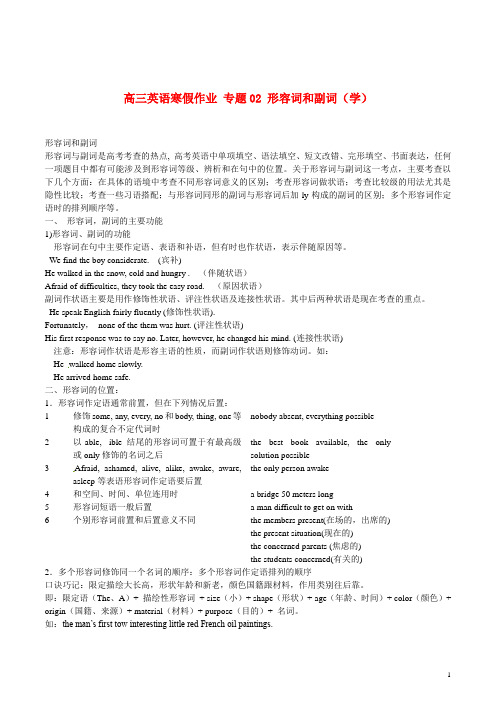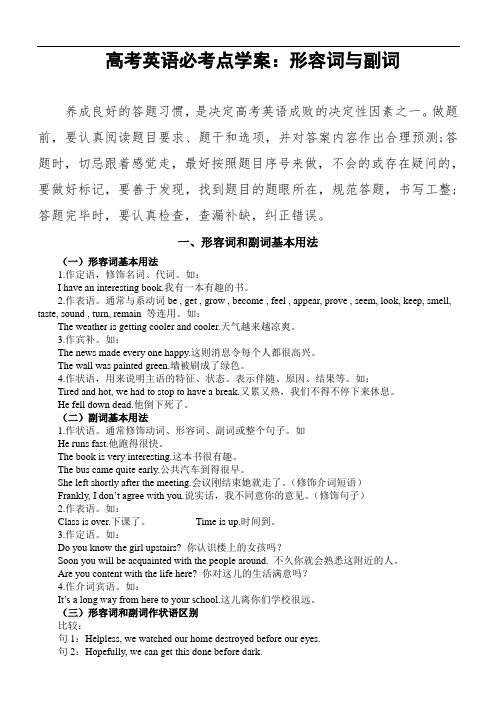高三英语形容词和副词
- 格式:ppt
- 大小:218.00 KB
- 文档页数:7

高三英语语法-形容词和副词复习第一节形容词和副词的作用1.形容词的作用1)作定语The present markets have taken a new look. 目前市场一派新气象。
2)作系动词的表语Their performance was excellent. He looks upset.This text seems difficult. He is said to have gone mad.3)作宾语补足语Who left the door open ? 谁没有关门?Something must be done to make the waste water clean.4)作伴随状况He waited outside, cold and hungry.His son returned home, safe and sound.(安然无恙)2.形容词作定语的位置1)形容词作定语通常放在被修饰的名词之前。
若出现多个形容词,排列顺序为:a)冠词——序数词——数量词——描绘性形容词I spent the last few sunny days at the seaside.b)描绘性形容词——大小——长短——新旧——国籍——材料build a fine new stone bridge He is a famous American writer.2)下列三种情况定语后置a)短语He was the only person awake at the moment.b)修饰不定代词If anything unusual happens, let me know.c)“a”开头的形容词He is the greatest artist alive today. 他是在世最伟大的艺术家。
Time alone will show who was right.(time alone=only time)只有时间能证明到底谁正确。

高考英语形容词和副词详解及练习-CAL-FENGHAI-(2020YEAR-YICAI)_JINGBIAN英语高考专题复习讲与练形容词和副词一、考点聚焦1、形容词、副词的作用与位置形容词是用来修饰名词的,常被放在名词前作定语,或放在系动词后面作表语。
而副词则用来修饰形容词、动词,其他副词或者句子,一般位于形容词之前,动词之后或句子之首。
以下属几种特殊情况,须牢记;(1)形容词短语作定语,定语后置。
a language difficult to master, a leaning tower about 180 feet high(2)表语形容词(afraid、alike、alone、asleep、awake、alive等)作定语,定语后置。
如a man alive。
有些表身体健康状况的形容词如well、faint、ill 只作表语。
sick既可作表语又可作定语,ill如作定语意为“bad”。
(3)用作定语,修饰由不定代词one、no、any、some和every构成的复合词如anything、something等时,通常后置。
如:I have something important to tell you.(4)else常用作疑问代词和不定代词的后置定语。
(5)enough、nearby修饰名词前置或后置,程度副词一般位于形容词、副词前面,enough修饰形容词、副词时,必须后置。
(6)几个副词并列作状语时,其顺序较灵活,但一般是:方式→地点→时间。
如:We had a good time together outdoors last Sunday.(7)频度副词如often、always、usually等在be动词后,行为动词前。
(8)副词作定语,定语后置。
如:The person there is waiting for you.(9)几个并列的形容词作定语,其语序通常为:限定语(The、A)+ 描绘性形容词 + size(大小)+ shape(形状)+ age(年龄、时间)+ color(颜色)+ origin(国籍、来源)+ material(材料)+ purpose(目的)+ 名词。

高三英语复习:形容词和副词比较高三英语备考:形容词和副词比较一,形容词与副词比较级的常用结构1.a。
+形容词或副词原级+as+比较结构(1)该结构还可以和名词搭配,须注意不定冠词a (an)的位置。
例如:Tom can't pay as higha price as I asked.(2)作否定比较时,常用not as/so.as。
2.形容词或副词比较级than比较结构例如:He is taller than I.(1)比较结构部分一般不用定冠词,但特指比较两者中的一个用定冠词the。
例如:He is the taller of the two.(Z)作否定比较要用“less+形容词/副词原形”的结构。
例如:Mary is less clever than Tom(3) more A than B:“与其说B倒不如说A”。
例如:He is more brave than wise与其说他机智,不如说他勇敢。
(4) the+比较级the+比较级:“越就越”。
例如:The faster an object moves, the greaterthe air resistance is.3.形容词、副词的最高级(1)用the+形容词或副词的最高级表达,并且有一个短语或从句表示在那个范围内。
例如:YVho is the mostclever child, Li Lei, Jim or Lily?(2)用no, nothing, can't, never等否定词十比较级表达。
例如:He had never spent a more worrying day.(3)在than后加all other... the others, any other.,.anyof the other... any of the others或anything (anybody) else表达。
例如:Sheplays the piano better than all other students/any of the otherstudents/any of the others/anybody else in herclass2 She plays the piano best in her class(4)用as+形容词或副词的原级+as possible/as onecan表达。

高考英语常考词性变化二、名词转换为形容词(1)ful,less结尾的形容词;aim→aimless 无目标的beauty→beautiful 美丽的breath→breathless 上气不接下气的care→careful→careless 小心的/粗心的color→colorful→colorless 多彩的/无色的cheer→cheerful 高兴的doubt→doubtful→doubtless 可疑的,不确定的/无疑的end→endless 无休止的faith→faithful 忠实的fear→fearful 可怕的home→homeless 无家可归的harm→harmful→harmless 有害的/无害的hope→hopeful→hopeless 抱有希望的/无望的help→helpful→helpless 有帮助的,愿意帮忙的/无助的job→jobless 无工作的joy→joyful 高兴的meaning→meaningful 有意义的mind→mindless 不留神的,愚蠢的peace→peaceful 和平的pain→painful→painless 痛苦的/不痛的power→powerful→powerless 强有力的/无力的price→priceless 珍贵的,无价的speech→speechless 说不出话的self→selfless 无私的success→successful 成功的thank→thankful 感激的tire→tireless 不知疲倦的use→useful 有用的wire→wireless 无线的①[2019·全国卷Ⅰ]Learning English as a second language can bea painful experience.把英语作为第二语言学习可能是一段痛苦的经历。
②[2017·北京高考]Jane moved aimlessly down the treelined street, not knowing where she was heading.简漫无目的地沿着绿树成荫的街道往前走,不知道要去哪里。


高中英语必修三副词表1. 善于解决问题的副词- Aggressively (积极主动地)- Creatively (有创造力地)- Efficiently (高效地)- Flexibly (灵活地)- Innovatively (创新地)- Resourcefully (善于利用资源地)- Strategically (策略性地)- Systematically (系统性地)- Thoughtfully (深思熟虑地)- Tactfully (机智地)2. 描述形容词的副词- Astonishingly (令人惊讶地)- Delightfully (愉悦地)- Exceedingly (非常地)- Exquisitely (精致地)- Impeccably (完美地)- Incredibly (难以置信地)- Remarkably (显著地)- Stunningly (令人惊叹地)- Terrifically (极好地)- Wonderfully (美妙地)3. 表示方式或程度的副词- Approximately (大约地)- Carefully (仔细地)- Definitely (肯定地)- Eagerly (渴望地)- Enthusiastically (热情地)- Entirely (完全地)- Fortunately (幸运地)- Hopefully (希望地)- Sincerely (真诚地)4. 表示时间或顺序的副词- Earlier (较早地)- Finally (最后地)- Frequently (频繁地)- Gradually (逐渐地)- Initially (最初地)- Occasionally (偶尔地)- Regularly (定期地)- Simultaneously (同时地)- Suddenly (突然地)- Typically (通常地)5. 表示原因或结果的副词- Accordingly (相应地)- Consequently (因此)- Definitely (明确地)- Hence (因此)- Naturally (自然地)- Obviously (明显地)- Therefore (因此)- Ultimately (最终地)- Unquestionably (毋庸置疑地) - Vital (至关重要地)以上是高中英语必修三的副词表。

高考英语:形容词和副词【考查要点】1)原级,比较级、最高级的选用及应用范围,复习中须注意如下句型的用法:①as+原级adj./adv.+as表“和…一样”;notas/so+原级adj./adv.+as表“不如…”。
例如:JohnplaysfootballaswellasDavid.Tomdoesnotplaythepianoso/aswellasJack.Theviolinintheothershopwillbecheaper,butnotasgood.②as+原级adj.+a(n)+n.+as表“跟…一样”。
如It’sbelievedthatteachingis asmuchanartas itisascience.Ourneighborhasasbigahouseasours .③比较级+than表“比…更”;less+原级+than表“不如…”。
如:Thisyeartheyhaveproducedlessgrainthantheydidlastyear.Thisroadiswiderthanthatone.④the+比较级,the+比较级表示“越…,就会越…”。
例如:It’sbelievedthattheharderyouwork,thebetterresultyou’llget.⑤the+比较级+ofthe+two/名词/代词表两者中“较…的一个”。
如:Whoistheyoungerofthetwoboys?⑥比较级+and+比较级表示:越来越…。
如:Ourcountryisgettingstrongerandstronger.⑦用thelast表示“最不可能的”、“最不适合的”、“最不希望的”等。
例如:ThelastthingIwanttodoistooffendyou.我最不愿意做的就是惹你生气。
(8)a/an+形容词最高级,表示的是:‘很,非常,极其’等意思,不是真正比较。
就是一种语气:Sheisabestfriendofmine.她是我一位非常要好的朋友。

形容词和副词教案考点一形容词、副词的词性转换1. Bend your knees slightly and reach out your arms like tree branches,naturally and ____________(soft).2. Everything seemed to be going ______(smooth) for the first days after I moved to New York.一、形容词——副词在形容词后加-ly可变成相应意义的副词。
1.直接加-ly slow慢的—— slowly缓慢地2.改y为-ily happy高兴的——happily高兴地3.去e加-ly true真的——truly真地后缀例词ableaccept→acceptable可接受的comfort→comfortable 舒适的fashion→fashionable 时髦的suit→suitable 合适的reason→reasonable 有道理的-almusic→musical音乐的origin→original 最初的person→personal 个人的;私人的center→central 中央的;中心的nature→natural 自然的;天生的-fuldoubt→doubtful怀疑的forget→forgetful 健忘的harm→harmful 有害的hope→hopeful 有希望的peace→peaceful 和平的-edscare→scared感到恐惧的confuse→confused 感到困惑的underline→underlined 下划线的-ingsurprise→surprising令人惊讶的convince→convincing 令人信服的satisfy→satisfying 令人满意的-ibleaccess→accessible容易取得的horror→horrible 可怕的;恐怖的terror→terrible 可怕的-iveact→active积极的;活跃的effect→effective 有效的;生效的attract→attractive 有吸引力的impress→impressive 给人深刻印象的-ouscontinue→continuous 不断的;持续的anxiety→anxious 忧虑的caution→cautious 十分小心的;谨慎的curiosity→curious 好奇的humor→humorous 幽默的-sometire→tiresome令人厌倦的trouble→troublesome 麻烦的-ytaste→tasty 美味的;可口的health→healthy 健康的wealth→wealthy 富裕的;丰富的-ern east→eastern东方的;向东的-ishchild→childish孩子气的fool→foolish 愚蠢的;可笑的self→selfish 自私的前缀illegal→illegal不合法的logical→illogical 不合逻辑的im-polite→impolite无礼的patient→impatient 不耐烦的in-formal→informal非正式的convenient→inconvenient 不方便的ir-regular→irregular不规则的responsible→irresponsible 不负责任的un-usual→unusual不寻常的willing→unwilling 不愿意的后缀-lesshope→hopeless绝望的end→endless 没完没了的用括号内所给词的适当形式填空1.You must look after yourself and keep____________(health).2.If we leave right away,____________(hopeful) we’ll arrive on time.3.(2014·高考新课标全国卷Ⅱ)There were many people waiting at the bus stop,and some of them looked very anxious and ____________(disappoint).4.(2014·高考广东卷)She was ____________(surprise)helpful.考点二形容词和副词的比较等级1. Raymond’s parents wanted him to have ____________(good) possible education.2. Tony can hardly boil an egg,still ____________(little) cook dinner.3. It may not be a great suggestion.But before a ____________(good) one is put forward.We’ll make do with it.4.(2013·高考天津卷)I think watching TV every evening is a waste of time—there are____________ (meaningful) things to do.等级形式意义原级as+adj./ad v.(原形)+as 和……一样as+形容词原级+a(n)+n.+as...和……一样not as/so...as... 和……不一样比较级...比较级+than 比……更……the+比较级+of the two+名词两者中较……的那个比较级+and+比较级越来越……the+比较级...,the+比较级越……就越……最高级the+最高级+比较范围最……...比较级+than anyother+单数名词比任何一个……都……...比较级+than allthe other+复数名词比其他所有……都……...比较级+than any-thing/anyone else比任何一个……都……否定词+比较级... 再……也不为过……这是我曾看过的最鼓舞人心的电影了。

语法复习十三:形容词和副词比较级和最高级及其使用副词的比较级和最高级1.大多数以ly结尾的副词前加more 和most 来构成比较级和最高级。
2.少数单音节副词,加er,est 构成其比较级和最高级。
比较级结构的修饰语1.用于原级之前:a l m o s t,n e a r l y,j u s t, e x a c t l y,q u i t e,h a l f, t w i c e,t h r e et i m e s,at h i r d,e t c.J o h n i sa l m o s t a st a l l a s y o u.T h er i v e r i st h r e e t i m e sa s l o n g a st h a t o n e.W e h a v e a t h i r d a s m a n y s t u d e n t s a sw e h a d l a s tt e r m.2.用于比较级前m a n y,af e w(用于"m o r e+可数名词"前)I t t a k e sm a n y m o r eh o u r s t o g ot h e r e b yt r a i n t h a n b yp l a n e.a l o t,m u c h,a b i t,e v e n,al i t t l e,s t i l l,ag r e a t d e a l,f a r,r a t h e r,t w o y e a r s,t e np e r c e n t,t h r ee t i m e s e t c.I t'sc o ld t h i sy e a r,b u ti t's e v e nc o lde r l a s ty e a r.W ep r o d u c e d6%m o r e g r a i nt h i s y e a rt h a n w e d i dl a s t y e a r.3.用于形容词和最高级前t h e v e r y, m u c h t h e,b yf a r t h e,t h ef i r s t/s e c o n dT h i s h a ti s b y f a r t h el a r g e s t i nt h e w o r l d.G o l d i st h e v e r y m o s tv a l u a b l e o fa l lm a t e r i a l s.位置与功能高考重点要求1.掌握形容词、副词比较级、最高级的常用句型及用法2.掌握形容词、副词的原级、比较级和最高级修饰语及倍数的比较表达。

高考英语语法知识总结形容词和副词高考英语语法知识总结(形容词和副词)如下:形容词、副词是每年高考必考点之一,近几年语境综合化程度越来越高,难度加大。
高考热点有:形容词、副词词义辨析;原级、比较级、最高级的使用;倍数的表达方法;比较等级的修饰语;多个形容词的排列顺序;常见形容词、副词的惯用法等。
关于形容词与副词这一考点,主要考查以下几个方面:1. 考查形容词和副词的基本用法形容词在句中一般作定语、表语、补语,而副词在句中主要作状语。
2. 考查形容词作定语的后置规律形容词作定语一般位于所修饰的名词前,但下列三种情况形容词要后置:①形容词短语作定语时;②表语形容词作定语时;③修饰复合不定代词时。
3. 考查多个形容词作定语的排序多个形容词修饰名词时,其排序规律是:(限定词+程度副词+) 描绘+大小(长短、高低)+形状+年龄(新旧)+颜色+国籍或产地+物质材料+类别或用途+名词。
4. 考查副词在句中的位置规律副词修饰形容词或其它副词时,一般位于被修饰词的前面,但enough却要放在被修饰的形容词或副词的后面。
5. 考查–ed形容词和-ing形容词的区别-ed形容词,通常说明人,意为“(某人)感到……”;-ing形容词通常说明事物,意为“(某事物)令人……”或“令人……的(事物)”。
6. 考查两种不同形式的副词的用法差异即考查与形容词同形的副词与形容词后加ly构成的副词的区别。
7. 考查形容词和副词的比较等级。
8. 考查比较等级的修饰语。
考点1:在具体的语境中辨析形容词与副词的语义从复现的频率来看,此点是高考对形容词、副词考查的第一大热点。
解答此类题关键是要分析具体的语境,结合基本词义、搭配等来选择正确的答案。
经过统计,常见常考的形容词和副词有(按频度排列):even; interested; interesting; yet; hardly; just; therefore; though; too; very; common; effective; either; ever; fair; however; less; more; nearly; only; purposefully; rather; still; such; surprised; surprising 还有以下形容词和副词应当熟悉和掌握: a good many; a number of; acceptable; accidentally; actively; adequately; already; another; anxious; anyway; ashamed; attentively; bad; badly; besides; better; but; careful; changeable; cheap; comfortable; convenient; eagerly; easy; encouraging; enha-ncing; equal; even though; eventually; fairly; far; fewer; following; formally; friendly; gen-erously; gradually; heavily; historic; hopefully; immediately; inaccessible; individual; inevit-able; initial; instead; invisible; largely; never; next; no; normal; nowadays; obviously; ordin-ary; other; otherwise; patient; plenty of; prac-tical; promoting; proper; quickly; readily; reasonable; remote; seldom; seriously; short; so; stimulating; traditional; unavailable; unav-oidable; unfavorable; unfortunately; usual; va-rious; weak; well考点2:考查形容词、副词的比较级、最高级及前面的修饰语【备考清单】1) 比较级、最高级的选用及应用范围比较级、最高级常用于表示两者或多者间的比较。

高三英语寒假作业专题02 形容词和副词(学)形容词和副词形容词与副词是高考考查的热点, 高考英语中单项填空、语法填空、短文改错、完形填空、书面表达,任何一项题目中都有可能涉及到形容词等级、辨析和在句中的位置。
关于形容词与副词这一考点,主要考查以下几个方面:在具体的语境中考查不同形容词意义的区别;考查形容词做状语;考查比较级的用法尤其是隐性比较;考查一些习语搭配;与形容词同形的副词与形容词后加ly构成的副词的区别;多个形容词作定语时的排列顺序等。
一、形容词,副词的主要功能1)形容词、副词的功能形容词在句中主要作定语、表语和补语,但有时也作状语,表示伴随原因等。
We find the boy considerate. (宾补)He walked in the snow, cold and hungry . (伴随状语)Afraid of difficulties, they took the easy road. (原因状语)副词作状语主要是用作修饰性状语、评注性状语及连接性状语。
其中后两种状语是现在考查的重点。
He speak English fairly fluently (修饰性状语).Fortunately,none of the them was hurt. (评注性状语)His first response was to say no. Later, however, he changed his mind. (连接性状语)注意:形容词作状语是形容主语的性质,而副词作状语则修饰动词。
如:He walked home slowly.He arrived home safe.二、形容词的位置:1.形容词作定语通常前置,但在下列情况后置:1 修饰some, any, every, no和body, thing, one等构成的复合不定代词时nobody absent, everything possible2 以-able, -ible结尾的形容词可置于有最高级或only修饰的名词之后the best book available, the only solution possible3 Afraid, ashamed, alive, alike, awake, aware,asleep等表语形容词作定语要后置the only person awake4 和空间、时间、单位连用时 a bridge 50 meters long5 形容词短语一般后置 a man difficult to get on with6 个别形容词前置和后置意义不同the members present(在场的,出席的)the present situation(现在的)the concerned parents (焦虑的)the students concerned(有关的)2.多个形容词修饰同一个名词的顺序:多个形容词作定语排列的顺序口诀巧记:限定描绘大长高,形状年龄和新老,颜色国籍跟材料,作用类别往后靠。


考点03 形容词和副词考点1 形容词、副词的比较等级一、平级比较1. "as+形容词+(a/an)+名词+as"表示同级比较,注意中间的形容词和名词并列时各自所在的位置。
☞It is generally believed that teaching is as much an art as it is a science.人们普遍认为,教学是一门科学,同时也是一门艺术。
2. "as+形容词/副词的原级+as"与"not as/so+形容词/副词的原级+as"表示同级比较,即两个或两部分人或物在性质上或程度上相同(不同)。
☞The work is not as/so difficult as you imagine.这项工作不是像你想像的那么难。
【特别提醒】as+形容词+as+数量词=数量词+形容词。
如:☞The building is as tall as 100 meters. = The building is 100 meters tall. 这栋楼有100米。
二、比较级1. 比较级的修饰语有: rather, much,still, any(否定句、疑问句中), even, far, a lot,a bit, a little,a great deal等。
☞He is much taller than Yao Ming. 他比姚明高多了。
☞The book is better by far than that one.这本书比那本书要好得多。
2. 比较级的常见结构:(1)“比较级+than”结构可以表达一方超过或低于另一方的情况。
☞You look much younger than I do. 你看上去比我年轻多了。
☞She doesn’t work harder than you. 她工作不如你努力。
(2)由more, fewer, less+名词构成的比较级①more “比……多”,后接复数名词或不可数名词☞I have more news books than my cousin.☞He has more milk than I .②less “比……少”,后接不可数名词☞He has less water than me.③fewe r“比……少”,后接复数名词☞They have fewer flowers than we .3. 比较级的特殊结构(1)The more…,the more…表示“越……,就越……”(more代表比较级)☞The more careful you are, the fewer mistakes you will make.你越细心,你犯的错误就越少。

高中英语语法知识:形容词和副词形容词是用来修饰名词或代词的词,主要用作定语、表语和补足语等。
副词是用来修饰动词、形容词、副词、介词短语或全句的词,主要用状语、表语和定语等。
下面就形容词和副词的相关知识作如下讲解。
1. 形容词及其用法1) 直接说明事物的性质或特征的形容词是性质形容词,它有级的变化,可以用程度副词修饰,在句中可作定语、表语和补语。
例如:hot。
2) 叙述形容词只能作表语,所以又称为表语形容词。
这类形容词没有级的变化,也不可用程度副词修饰。
大多数以a开头的形容词都属于这一类。
例如:afraid 害怕的。
这类词还有well,unwell,ill,faint,afraid,alike,alive,alone,asleep,awake 等。
3) 形容词作定语修饰名词时,要放在名词的前边。
但是如果形容词修饰以-thing 为字尾的词语时,要放在这些词之后。
例如:something nice.2. 以-ly结尾的形容词1) 大部分形容词加-ly可构成副词。
但friendly,deadly,lovely,lonely,likely,lively,ugly,brotherly,仍为形容词。
改错:(错) She sang lovely.(错) He spoke to me very friendly.(对) Her singing was lovely.(对) He spoke to me in a very friendly way.2) 有些以-ly 结尾既为形容词,也为副词,如daily,weekly,monthly,yearly,early等。
例如:The Times is a weekly paper. 《时代周刊》为周刊。
The Times is published weekly. 《时代周刊》每周发行一期。
3. 用形容词表示类别和整体1) 某些形容词加上定冠词可以泛指一类人,与谓语动词的复数连接,如the dead,the living,the rich,the poor,the blind,the hungry等。

高考英语形容词和副词形容词(Adjectives)和副词(Adverbs)是英语语法中非常重要的词类,在高考英语考试中占据着重要地位。
本文将从形容词和副词的定义、用法以及相关练习等方面进行论述。
一、形容词的定义和用法形容词是一种用来修饰名词或代词的词类。
它可以描述事物的性质、特征或状态,使句子更加详细和丰富。
形容词通常出现在名词前面,用来修饰它所在的名词,起补充说明的作用。
1.1 形容词的定义形容词是一类可以修饰名词或代词的词,以描述人、事、物的性质、特征和状态。
1.2 形容词的用法形容词可以通过以下几种方式使用:(1)作为定语修饰名词:a beautiful girl(一个漂亮的女孩)(2)作为表语:The weather is sunny.(天气晴朗)(3)作为宾补:I found the book interesting.(我觉得这本书有趣)二、副词的定义和用法副词是一种修饰动词、形容词、副词等的词类,用来说明行为或状态的方式、程度、频率、原因等。
副词可以增加句子的信息量,使句子更加准确和精确。
2.1 副词的定义副词是一类修饰动词、形容词或其他副词的词,用以表达行为或状态的方式、程度或其他相关信息。
2.2 副词的用法副词可以通过以下几种方式使用:(1)修饰动词:He runs quickly.(他跑得快)(2)修饰形容词:She is extremely beautiful.(她非常漂亮)(3)修饰副词:He reads very carefully.(他读书很认真)三、形容词和副词的比较级和最高级形容词和副词在表示比较程度时,可使用比较级和最高级。
比较级用于两者之间进行比较,最高级用于多者之中的极端比较。
3.1 形容词和副词的比较级和最高级形式(1)一般情况下,添加-er表示比较级,添加-est表示最高级。
如:fast → faster → fastest(2)以不发音的e结尾的词,直接加-r表示比较级,加-st表示最高级。

高三英语英语语法基础知识:形容词、副词、介词、连词知识精讲1. 形容词:表示名词的性质和特征的词叫做形容词,形容词可以用作定语、表语、宾语补足语和状语等。
(1)在使用形容词时要注意它的原级、比较级和最高级。
注意一般形容词比较级是:原级+—er,最高级是,原级+—est;部分双音节及多音节形容词的比较级是:more+原级,最高级为most+原级。
如:nice—nicer—nicest,beautiful—more beautiful / —most beautiful 少数形容词的比较级和最高级的变化不规则。
如:goodwellbetter bestmanymuchmore mostbad worse worstlittle less leastfar farther farthest further furthestoldolder oldestelder eldest ⎫⎬⎭⎫⎬⎭⎧⎨⎩⎧⎨⎩——————————————(2)形容词比较级可以有even, much, many, a bit, still, a little等状语来修饰。
如:Millions of other stars are even bigger and brighter than the sun. They look small only because they are much farther away.In fact, the earth is a bit nearer to the sun during our winter.(3)注意能分析出与形容词比较等级有关的句型。
①……than…………比……Is their room larger than ours?②最……These three parks are all very beautiful, but this one is the most beautiful of the three.③……与……一样……as……as……Chinese is as important as maths.④……不如…………not so(as)……as……Making model boats isn’t as difficult as making model planes.Wang Ping is not so tall as Li Ping.⑤最……之一……one of / among the……The Changjiang River is among the longest rivers in the world.⑥越来越……形容词比较级+and+形容词比较级Soon autumn came and it became colder and colder.⑦第……最……序数词+最高级Africa is the second largest continent.⑧越……越……the +比较级……,the+比较级……The farther away the feeding place was, the slower the dance was.The more you practice, the better you pronounce.⑨尽可能……as+原级+as possibleThe old men and the boys made the wounded as comfortable as possible.(4)下列词一般只用作表语,不用作定语。

高考英语必考点学案:形容词与副词养成良好的答题习惯,是决定高考英语成败的决定性因素之一。
做题前,要认真阅读题目要求、题干和选项,并对答案内容作出合理预测;答题时,切忌跟着感觉走,最好按照题目序号来做,不会的或存在疑问的,要做好标记,要善于发现,找到题目的题眼所在,规范答题,书写工整;答题完毕时,要认真检查,查漏补缺,纠正错误。
一、形容词和副词基本用法(一)形容词基本用法1.作定语,修饰名词、代词。
如:I have an interesting book.我有一本有趣的书。
2.作表语。
通常与系动词be , get , grow , become , feel , appear, prove , seem, look, keep, smell, taste, sound , turn, remain 等连用。
如:The weather is getting cooler and cooler.天气越来越凉爽。
3.作宾补。
如:The news made every one happy.这则消息令每个人都很高兴。
The wall was painted green.墙被刷成了绿色。
4.作状语,用来说明主语的特征、状态。
表示伴随、原因、结果等。
如:Tired and hot, we had to stop to have a break.又累又热,我们不得不停下来休息。
He fell down dead.他倒下死了。
(二)副词基本用法1.作状语。
通常修饰动词、形容词、副词或整个句子。
如He runs fast.他跑得很快。
The book is very interesting.这本书很有趣。
The bus came quite early.公共汽车到得很早。
She left shortly after the meeting.会议刚结束她就走了。
(修饰介词短语)Frankly, I don’t agree with you.说实话,我不同意你的意见。